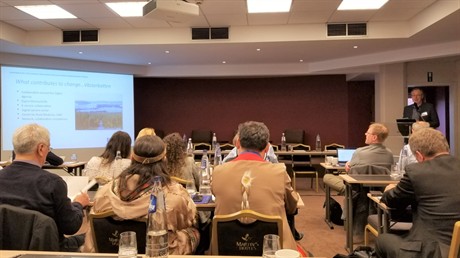EU-Arctic final conference with North Sweden
On March 25 the European External Action Service, EEAS, held their third gathering in Brussels with a dialogue with Arctic representatives about Arctic interests. This is part of the work the EU is doing on Arctic policy that is in cooperation with the EEAS and the maritime unit in the European commission.
 Lars Eriksson, Digitala Västerbotten, presents the region´s digital change
Lars Eriksson, Digitala Västerbotten, presents the region´s digital change
Different themes focusing on sustainable development
The day stated off with Michael Byers from University of British Columbia in Canada presenting current processes with the challenges within climate change, the demands of digitalization on connectivity and growing international tensions. Byers finds that there are many different Arctic, and as there are global challenges in the Arctic, there are also possibilities for finding solutions. Sustainable climate solutions in the Arctic are tools for global solutions, to connect the artic regions gives us tools for new distance crossing solutions where cooperation are a part of the history of survival in the Arctic and the meaning continues to grow, where the Arctic can remain a conflict free zone in an increasingly problematic world.
The day continued with three panels on the themes:
- Adaptation and change to a carbon dioxide low economy
- Potentials for green and blue growth
- Digital solutions in the Arctic
Participators were scientists, indigenous people’s representatives, representatives for different regions as well as from the EU and the Arctic countries. The discussion breached topics like whale movement causing fish stocks to move into areas where indigenous people need them to Finland listing an arctic design policy as a way of creating growth for the whole region in a global context.
Northern Sweden and the EU´s own arctic regions in the discussion
Participating from northern Sweden was Lars Eriksson, Digital Västerbotten, who presented the necessities of cooperation through a common digital agenda in order to create connectivity throughout the region and most of all the necessity of competence when broadband infrastructure has been put in place.
Johannes Lith from Finnish Lapland presented the ongoing work in the Northern Sparsely Populated Areas, NSPA, to establish an arctic investment platform, where Norrbotten and Västerbotten is included, to get access to investment capital for development in the region in cooperation with the EU and the European Investment Bank, EIB, amongst others.
Stephen Hart from the EIB spoke on the need of investments and focus on sustainable investments that give long term sustainable developments rather than short term profit, which is of extra importance for the Arctic region. He talked on wind parks and battery factories in northern Sweden but also new tools like social investments funds for innovation in the public sector and social services including social care and the establishment of a circular economy rather than linear. He pointed out that one of the challenges is that the Arctic countries do not always live up to the focus of their own policy, because of lack of investment and development in the northernmost areas.
The day was rounded off with the EU´s arctic ambassador Marie-Anne Coninsx summing up the discussion, the conference and its continued importance as well as how important the dialogue is to understand the challenges and the paths in which to handle them. Also, on what role the EU can play for its northern regions and the entire Arctic.
Mikael Janson, North Sweden European Office, pointed out the importance of the EU´s engagement in the European Arctic and welcomed everyone to a continued dialogue at the first real EU Arctic Forum, held in Umeå 3-4 October, a cooperation between the EU, the Swedish Ministry of foreign affairs and the northern Swedish counties, Västerbotten and Norrbotten.
/Mikael Janson
Learn more about the EU´s arctic policy.
Learn more about the ongoing review of the policy.
